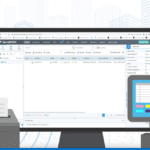Non classifié(e)
42Gears unveils Industry’s First ChatGPT Plugin for Mobile Device Management
We are thrilled to unveil the latest innovation from 42Gears—the SureMDM ChatGPT plugin. This simple yet sophisticated plugin allows you to secure, monitor, and manage your fleet of mobile devices directly from within ChatGPT using everyday conversations. As businesses embrace digital transformation and mobile technologies, managing and securing mobile devices has become increasingly intricate. We,…
Lire la suite5 Challenges Faced by Developers and Testers Building Digital Health Apps and Technologies
Developers and QA professionals involved in building digital health technologies such as clinical trial software require the resources that allow them to develop and test their apps at scale while ensuring security. This article lists five challenges that they regularly face: 1. Device Fragmentation: There are a vast number of different mobile devices available on…
Lire la suiteNew Feature Alert: AstroFarm now offers Performance Monitoring for iOS and iPadOS devices
As mobile app development continues to evolve, it’s crucial to test apps on both iOS and iPadOS to ensure compatibility, usability, and consistency. For instance, it’s no secret that Android has long dominated the global smartphone market. However, the market trend of choosing iPhones over Androids has resulted in a significant shift in market share,…
Lire la suiteEmbracing the power of Artificial Intelligence in Mobile Device Management
In recent years, artificial intelligence (AI) has seen incredible advances, making its way into a growing number of industries. One of the areas where AI is expected to have a significant impact in the coming years is mobile device management (MDM). With the proliferation of mobile devices, managing them has become increasingly complex, and organizations…
Lire la suiteEpson Printer Management Made Easier: SureMDM Now Supports Epson POS Receipt Printers
Epson POS printers are everywhere–from small retail shops to large hospital chains. When printers go down, business operations get largely impacted, leading to customer dissatisfaction and revenue loss. It’s therefore important for businesses to ensure that all the printers are working as intended, and that is what SureMDM’s Things Management Technology does. It allows you…
Lire la suiteJob and Profile Revision History is now available on SureMDM
Jobs are a set of tasks that can be created and remotely deployed on enrolled device(s) or group(s). For example, using Jobs, IT administrators can install/uninstall applications, remotely wipe/lock/shut down devices, configure application settings and permissions, and so on. Profiles are a set of policies and configuration settings that allow administrators to control the functions…
Lire la suite5 Ways ChatGPT Can Transform Mobile Device Management: Tips, Tools, and Best Practices
ChatGPT has taken the world by storm. At the time of this writing, ChatGPT 4.0 has been released. People from all walks of life are using ChatGPT to quickly find answers to their questions using prompts. For example, one can ask, « What tool can I use to backup select folders on Windows to the cloud? »…
Lire la suiteTesting Best Practices to Follow in 2023
Software testing is an integral part of the software development life cycle, as it helps in the identification and elimination of errors and bugs before an application is released. If you’re new to testing and looking to learn how to perform tests to deliver high-quality applications/products, you’ve come to the right place. In this blog,…
Lire la suite4 Key Features Every Remote Desktop Software must have in 2023
Remote desktop software has come a long way in becoming an essential component for setting up and securing modern workplaces. For mitigating the negative impact caused by the COVID-19 outbreak on enterprises and businesses, remote desktop software is widely regarded as a critical lifeline for IT and operations teams. By enabling businesses to shift to…
Lire la suiteWhat is Android Enterprise Security and how does it work?
Android Enterprise Security is a set of features and policies that are built into the Android operating system to help businesses keep their devices and data secure. The core of Android Enterprise Security is the Android Management API, which allows businesses to manage and secure their devices through a single, unified platform. One of the…
Lire la suite








